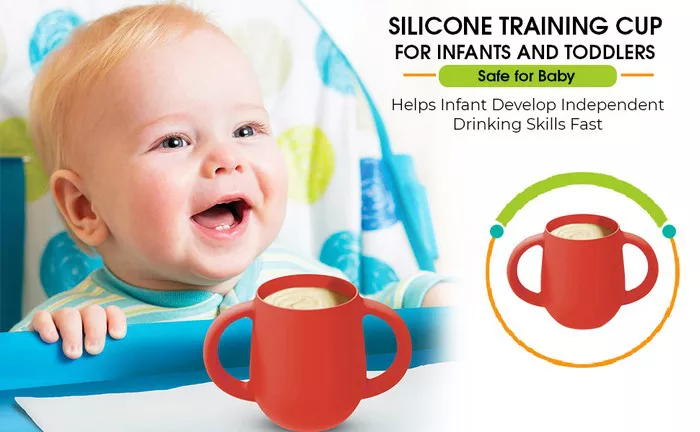Sippy cups have long been a staple in the arsenal of parents navigating the transition from bottle or breast to independent drinking for their toddlers. However, recent concerns about the potential negative effects of sippy cups on oral development and overall health have prompted many parents to seek alternative options. In this article, we’ll explore the drawbacks of traditional sippy cups and introduce a variety of alternatives that promote healthier drinking habits for toddlers.
The Problem with Sippy Cups
Sippy cups were originally designed to help toddlers transition from bottles to regular cups by providing a spill-proof option that still allowed them to drink independently. However, these cups have come under scrutiny for several reasons:
1. Oral Development Concerns: Sippy cups can interfere with the natural development of oral motor skills, including tongue placement and swallowing patterns. Prolonged use of sippy cups may contribute to speech and feeding difficulties in some children.
2. Dental Issues: Sippy cups, especially those with spouts, can promote prolonged sucking behaviors that may lead to dental problems such as tooth decay and misalignment of the teeth.
3. Hygiene Challenges: Cleaning sippy cups with multiple parts, such as valves and straws, can be cumbersome and may lead to bacterial growth if not done properly.
4. Dependency on Spill-Proof Design: While spill-proof features are convenient for parents, they may hinder children’s ability to learn how to drink from an open cup, which is essential for developing oral motor control and coordination.
Given these concerns, many parents are seeking alternatives to sippy cups that support healthy oral development and hydration habits in toddlers.
Alternative Options
Fortunately, there are several alternatives to traditional sippy cups that promote independent drinking while addressing the drawbacks mentioned above. Here are some options to consider:
1. Open Cups: One of the simplest alternatives to sippy cups is using open cups or small glasses. While this may initially result in more spills, it encourages children to develop proper drinking skills and mouth control. Start with small amounts of liquid and gradually increase as your child becomes more adept at drinking from an open cup.
2. Training Cups: Training cups are designed with handles and a spoutless rim, making them easier for toddlers to grip and drink from. These cups promote a more natural drinking motion and can help toddlers transition to open cups more smoothly.
3. Straw Cups: Unlike traditional sippy cups with spouts, straw cups encourage a sucking motion similar to drinking from a regular straw. Look for cups with soft, silicone straws that are gentle on gums and teeth. Additionally, choose straw cups that are easy to disassemble and clean to prevent bacterial buildup.
4. 360-Degree Cups: 360-degree cups feature a rimless design that allows toddlers to drink from any side of the cup. These cups mimic the experience of drinking from an open cup while still preventing spills, making them a popular choice for parents looking to transition away from traditional sippy cups.
5. Water Bottles with Spouts: For on-the-go hydration, consider using water bottles with spouts designed specifically for toddlers. Look for bottles with spill-proof features and easy-to-clean designs. Encourage your child to drink water regularly throughout the day, especially during activities and outings.
6. Reusable Pouches: Reusable pouches are another convenient option for providing liquids to toddlers, especially when traveling or on-the-go. Fill the pouches with water, juice, or smoothies and let your child drink directly from the spout. Choose pouches made from safe materials that are easy to clean and refill.
7. Regular Cups with Silicone Lids: If you prefer to use regular cups but want to minimize spills, consider adding silicone lids or covers to prevent liquid from spilling out. These lids provide a spill-proof seal while still allowing toddlers to drink from a regular cup.
Tips for Transitioning Away from Sippy Cups
Transitioning away from sippy cups may take time and patience, but with consistency and encouragement, most toddlers can adapt to new drinking methods. Here are some tips to help make the transition smoother:
1. Introduce Alternative Cups Gradually: Start by offering alternative cups during meal times or snacks when your child is calm and relaxed. Allow them to explore the new cup at their own pace without pressure.
2. Model Proper Drinking Techniques: Demonstrate how to drink from the new cup yourself and encourage your child to imitate you. Offer praise and positive reinforcement when they make progress.
3. Offer Choices: Let your child choose which cup they want to use, whether it’s an open cup, straw cup, or training cup. Giving them autonomy can help them feel more comfortable with the transition.
4. Be Patient: Transitioning away from sippy cups may not happen overnight, and there may be some spills and setbacks along the way. Be patient and supportive, and celebrate small victories along the journey.
5. Limit Sippy Cup Use: Gradually decrease the use of sippy cups over time, reserving them for situations where spills are more likely, such as in the car or during outdoor activities.
Conclusion
While sippy cups have long been a go-to option for parents of toddlers, concerns about their impact on oral development and overall health have led many parents to seek alternatives. By transitioning to alternative cups such as open cups, straw cups, and training cups, parents can promote healthier drinking habits and support their child’s oral development. With patience, consistency, and encouragement, toddlers can learn to drink independently while reducing reliance on spill-proof sippy cups.


